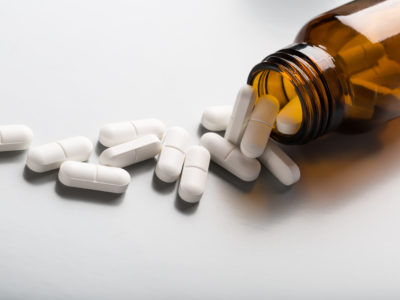Table of Contents[Hide][Show]
When is too much of a good thing not a good thing?
When it comes to your health, antibiotics can be helpful, protecting your body from bacterial infections.
But there’s a dark side to antibiotics as well!
Far from being a cure-all, they can have a surprisingly detrimental effect on your health—especially your immune system.
Let’s delve into the world of antibiotics to better understand how they work, how they affect your health, and their positive or negative impact on your immune system.
All About Your Immune System
Your immune system is your body’s defense team, protecting you from bacteria, viruses, toxins, and other harmful invaders.
There are several components to your immune system, each doing its job to keep you healthy.
- White blood cells (leukocytes) fight infections.
- T cells attack and destroy infected cells; they also “remember” infections for a swift response in cases of future infections.
- B cells produce antibodies.
- Antibodies (immunoglobulins) are the proteins produced by B cells. They bind to foreign substances (antigens) to neutralize them.
When faced with health threats, the different parts of your immune system work together to eliminate these attackers and safeguard your health and well-being.
The key to this is a balanced immune response.
- An underactive immune response provides inadequate defense. It might not fully protect you from those tiny attackers, leaving you susceptible to illness, infections, and chronic issues. You may feel sick frequently or have illnesses that you just can’t get rid of.
- An overactive immune response can cause your body to attack all of the cells, including healthy cells. This causes other issues, such as allergies, eczema, inflammation, and even some autoimmune diseases.
In a healthy body, your immune response is balanced—just enough to fight off illnesses and infections, without overworking and attacking healthy cells.
But sometimes, your body’s natural defense isn’t enough. You need extra help. And that help comes in the form of antibiotics.
Related
Post-Viral Syndrome – Gut Health Connection
Have you ever recovered from an illness, such as the flu, yet continued to feel completely drained of energy? You’re physically healthy, you’re not coughing or sneezing, yet you’re completely exhausted. What gives? Unfortunately, you may have recovered from the virus, only to fall into post-viral syndrome. Are you experiencing post-viral syndrome? What are the …
How Antibiotics Work
Antibiotics refer to medications that stop bacteria from growing.
They’re commonly prescribed to treat your body when you have a bacterial infection such as strep throat, an ear infection, or a urinary tract infection. But viral infections, such as colds or the flu, won’t respond to antibiotic treatment.
Antibiotics treat bacteria in one of two ways.
- They kill existing bacteria.
- They stop bacteria from multiplying.
Antibiotics must be prescribed by a medical professional; they aren’t available over the counter.
And, your antibiotic treatment will be tailored specifically to your health. Based on factors such as the type of illness/infection, its severity, and your overall health, your doctor will decide which antibiotic you should take, in what dosage, and for how long.
Antibiotic Side Effects
Antibiotics can be an effective way to treat an infection, but are the risks worth it?
These are some of the possible side effects of antibiotics.
- Diarrhea
- Dizziness
- Nausea
- Rash
- Vomiting
- Yeast infection
More severe side effects can include an allergic reaction or a C. diff infection.
But what about your immune system? Can taking antibiotics have a negative impact on your immune system?
How Antibiotics Affect Your Immune System
If you read over those symptoms, you may have noticed one thing that most of them have in common: they’re digestive issues.
Even the ones that aren’t digestive conditions, such as skin issues or a yeast infection, are directly related to your digestive health through your gut microbiome.
A Quick Intro to Gut Health
Before we explore how antibiotics affect your gut—and, later on, your immune system—let’s backtrack for a moment and look at your gut microbiome.
Your microbiome is home to the vast majority of the trillions of bacteria that live inside your body. There are countless strains of varying strengths and impact, but they can be broken down into 2 groups.
- Beneficial (“good”) bacteria
- Pathogenic (“bad”) bacteria
Your gut hosts colonies of beneficial and pathogenic bacteria, both. But with limited space inside your digestive tract, the two types of bacteria are in a constant struggle for dominance.
When one type of bacteria strengthens and multiplies, it crowds out the other bacteria.
Ideally, your beneficial bacteria will thrive while your pathogenic bacteria declines, leading to a healthy gut and overall emotional, physical, and mental well-being.
However, antibiotics can disrupt this precarious balance in your gut microbiome.
How Antibiotics Disrupt Your Gut Balance
In a perfect world, the antibiotics you take would swoop in, destroy all harmful bacteria, and then exit your body, leaving you in prime health.
Unfortunately, that’s not how it works.
The antibiotics you take to treat an illness or infection don’t distinguish between good and bad bacteria. In fact, they can often wipe out your entire gut microbiome, disrupting its precarious balance—and leaving plenty of room for colonies of pathogenic bacteria to take over when the dust settles.
This upheaval in your gut microbiome is why most of the side effects of antibiotics are digestive in nature. Even the ones that aren’t related to gastrointestinal issues, such as rashes and yeast infections, are issues related to gut health.
Clearly, antibiotics can interfere with gut health. What about immune health?
Related
Antibiotics, Their Side Effects, and How to Avoid Them
Learn about antibiotics side effects (from long and short-term use) and what probiotics to take while on antibiotics to help repair the damage they cause to your gut health.
Why Does Your Gut Affect Your Immune System?
Up until now, we’ve focused on how antibiotics affect your gut microbiome. But how does that connect to your immune system? Let’s take a closer look…
The Link Between Your Microbiome and Your Immune System
Roughly 80% of your immune system is housed in your gut, creating a strong, undeniable link between your gut health and your immune health.
When your gut is healthy and balanced, with strong, thriving colonies of beneficial bacteria, your immune system is also resilient and robust.
Unfortunately, the opposite is also true. When your gut health is compromised, so is your immune system.
That’s why antibiotics can be so detrimental to your health.
What Happens to Your Immune System When You Take Antibiotics?
When antibiotics clear out your entire microbiome, they don’t just target harmful bacteria. They also eliminate beneficial bacteria, leaving your gut vulnerable to the formation of new bacterial colonies.
But your body is already not in the greatest health. You’re battling an illness or infection, possibly stressed out over your health issues, probably not sleeping as well as usual, and most likely not exercising much (if at all).
Together, these factors can create a “perfect storm” in your microbiome that allows it to be re-populated by pathogenic bacteria.
And since most immune cells reside in your microbiome, this imbalance doesn’t just affect your digestive system. It directly weakens your immune system’s ability to defend against future illness.
Some studies show that antibiotics can affect your immune system’s ability to adequately do its job.
Yet another study indicates that antibiotics make some immune cells weaker and less effective at fighting infections.
How to Counteract Antibiotics
Despite the negative way antibiotics affect your gut and immune health, there are times when taking them is a medical necessity.
In those instances, follow these strategies to keep your immune system robust and strong.
Take a Probiotic
When you take a probiotic supplement, the probiotic bacteria join forces with the existing colonies of beneficial bacteria, adding to their strength and promoting gut balance.
We’re big fans of Just Thrive Probiotic, an award-winning probiotic with a 100% survivability rate, thanks to its spore probiotic strains, which have a natural endospore “armor” that protects them from stomach acids, digestive zymes, bile, and more that kill off most other bacteria.
This probiotic contains four clinically proven, DNA-verified bacterial strains carefully selected for their ability to support digestion, produce antioxidants, and promote immune system function.
Try Just Thrive Probiotic right now and save 25% during the Black Friday sale!
Eat Healthy Foods
Nutrition, with an emphasis on whole, organic foods, is an essential part of gut health and immune health.
Probiotic-friendly foods can work together with a quality supplement to encourage the growth of beneficial bacteria in your gut.
These foods include:
Add in a healthy mix of vitamins, minerals, and other nutrients, and your diet will help you overcome the possible side effects of antibiotics.
Move Your Body
Research shows that moderate exercise can have a positive effect on your immune system.
While you might not feel up to a strenuous training session while you’re taking antibiotics, even simple activities such as going for a walk, cleaning, gardening, and playing with your kids can help counter the negative effects of antibiotics.
And, exercise is good for your gut health too, providing a double-defense against the side effects of antibiotics.
Final Thoughts
It would be great to live in a world where perfect health was the norm. But bacteria happens. Illnesses and infections are unavoidable, and sometimes a round of antibiotics is necessary.
Unfortunately, while antibiotics target harmful bacteria, they can also disrupt your gut microbiome, leading to weakened immunity and other health issues.
Luckily, with some simple countermeasures, you can strengthen your immune system right where it lives: your gut microbiome.
By nurturing your gut health, you promote your natural immune defenses, helping you bounce back from antibiotic effects.
You May Also Like…






